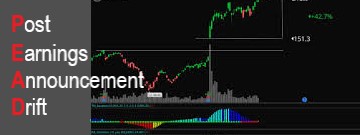
Post-earnings-announcement drift is the tendency for a stock’s price to drift in the direction of an earnings surprise in the months following an earnings announcement. The drift is also commonly referred to as the SUE (standardized unexpected earnings) effect and appears to be an enduring feature of stock returns. Researchers have proposed three general explanations for the SUE effect. Some believe the apparent drift is due to methodological shortcomings of the studies that document it. Others believe the drift represents systematic misestimation of expected returns following earnings surprises. Still others think the drift is the result of investors who underreact to value-relevant earnings information. The third explanation, however, raises the question of why unbiased investors, call them arbitrageurs, do not or cannot eliminate the underreaction and enforce market efficiency.
Using Post Earnings Announcement Drift
This phenomenon has frequently been used as the basis for a standalone event driven investment strategy. Results however are difficult to analyse as ongoing market factors can combine with earnings sentiments to move a stock price. Another issue is the classification and definition of earnings. Whether analysts use EBITDA or some other metric can have large effect on the results of back testing. Academic debate has continued on this topic for a great number of years. Therefore separating out and isolating the Post Earnings Announcement Drift becomes difficult to do. It is more likely that event driven investment firms that use this factors will do so in conjunction with other factors so as to construct a more reliable investment strategy.
Investors who diligently believe in the Efficient Market Hypothesis struggle to accept the validity of PEAD whilst many more market observers tend to acknowledge its existence whilst accepting its limitations in quantification.
